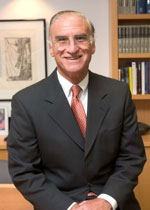Dr. C Ronald Kahn
International Awards
Hamdan Award for Medical Research Excellence
- Genetics in Diabetes
1999-2000
Dr. C Ronald Kahn is widely recognized as one of the top physician/scientists working in the field of diabetes. He is Professor of Medicine at Harvard Medical School and Director of the prestigious Joslin Diabetes Center in Boston, MA, USA. In 1999 he was elected to the USA National Academy of Sciences.
Prof Kahn has made multiple seminal observations in the area of the molecular and cellular mechanisms of insulin action, alterations in insulin action in the pathophysiology of disease, and the role of genes involved in Type 2 (non-insulin Dr C RONALD KAHN dependent) diabetes mellitus. Dr Kahn received his M.D. from the University of Louisville School of Medicine. He was Senior Investigator and ultimately Section Head at the Diabetes Branch in the National Institute of Arthritis, Metabolism, and Digestive Diseases of the NIH. In 1981, Dr Kahn moved to Boston to become Research Director of the Joslin Diabetes Center.
Dr Kahn played a central role in the initial characterization of the insulin receptor studies which formed the basis for subsequent work on hormone receptor interactions in many systems. Dr Kahn's group provided the major breakthrough in insulin action research and the genetics of Type 2 diabetes with their report that the insulin receptor is a member of the family of receptor tyrosine kinases. Over the past five years, Dr Kahn's laboratory has been the world's leader in creating mouse models of diabetes using the newly discovered techniques of targeted gene knockout by homologous recombination. In the first of these studies, Dr Kahn and his associates used this technique to create mice genetically lacking IRS-1 and demonstrated the major role of IRS-1 in insulin action. More importantly, they also demonstrate expression of a novel new substrate of the insulin receptor, termed IRS-2, which partially rescues the mice from a complete blockage of this pathway, as well as IRS-3. Using the Cre-Iox system to allow conditional gene inactivation, Dr Kahn's laboratory has created mice with selective knockouts of the insulin- signaling pathway in muscle, liver, fat and even pancreatic beta cell.
Dr Kahn has also made major contributions to our understanding of the genetic lesions in humans with Type 2 diabetes. This is an extremely important work since Type 2 diabetes accounts for 90-95% of all diabetes in the world and is the fastest growing form of the disease. In summary, Dr Kahn has held a preeminent position at the leading edge of insulin action and diabetes-related research throughout his distinguished career. His unique observations have revolutionized the field and shed new light on the pathogenesis of diabetes.

